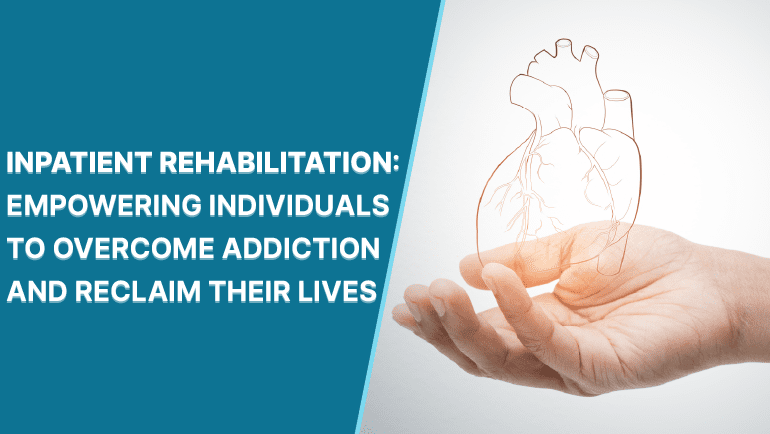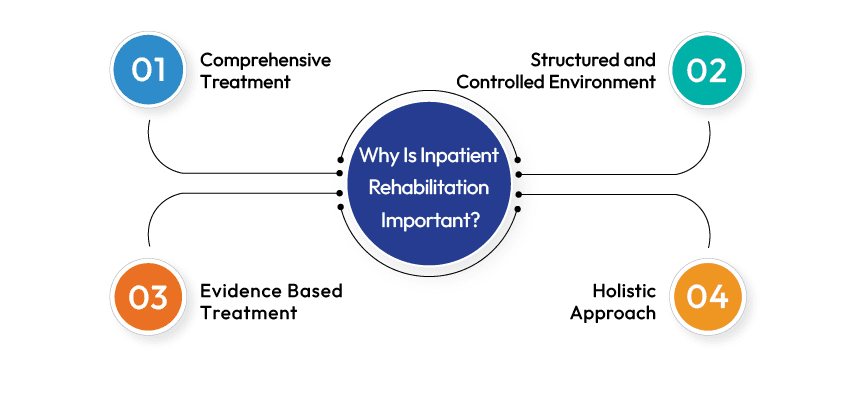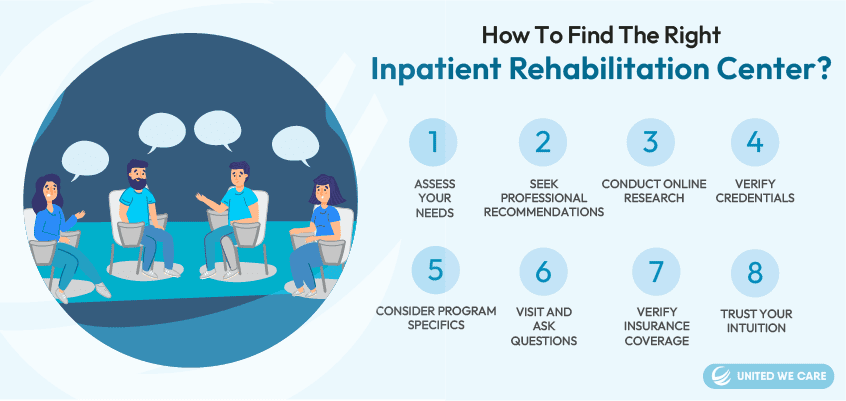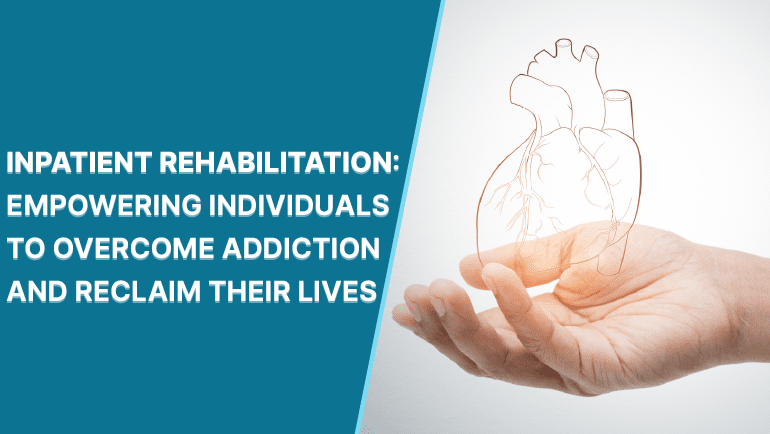
Introduction
People struggling with addiction or substance abuse often face challenges, in managing their addiction while living in their environment. They may lack strategies to handle the triggers and cues around them. As a result they seek out facilities that can provide treatment and a structured environment for healing and overcoming their habits.
What Is Inpatient Rehabilitation?
Inpatient rehabilitation refers to programs designed for individuals dealing with substance abuse and addiction. Those struggling with addiction opt for these programs as they offer round the clock care and a structured setting where they can heal gain insight into their behavior and learn coping mechanisms to address it. Typically individuals who choose rehabilitation stay at the facility for a duration based on the programs length. During this time they receive medication assisted therapy to manage drug withdrawal symptoms engage in psychotherapies to address effects of addiction and participate in group therapies that help them develop skills to combat social isolation.

- Comprehensive Treatment: Inpatient rehabilitation provides treatment options, for individuals grappling with addiction disorders. It aims to educate individuals about the nature of addiction both its term and long term impact well as why it can be challenging to resist addictive substances. Inpatient rehabilitation offers care with a team of professionals including psychiatrists, psychologists, rehabilitation experts and social workers who’re available 24/7.
- Structured and Controlled Environment: Inpatient rehabilitation provides a structured and controlled environment that eliminates access to drugs or alcohol reducing the chances of relapse. By removing individuals from their surroundings and routines inpatient rehab helps break patterns and offers a fresh start
- Evidence Based Treatment: The intensive nature of rehabilitation allows for concentrated treatment. With access to evidence based therapies and interventions individuals can address the root causes of their addiction while developing coping skills. Group therapy sessions provide opportunities for peer support and shared experiences which foster a sense of community.
- Holistic Approach: Additionally inpatient rehabilitation often incorporates approaches such as exercise, nutrition guidance and mindfulness practices that promote wellness. The extended duration spent in rehab enables individuals to establish a foundation, for recovery while developing strategies to prevent relapse.
Looking for the rehabilitation center requires careful thought and research. Here are some steps to guide you in your search;
How To Find The Right Inpatient Rehabilitation Center?
Finding the right inpatient rehabilitation center near you requires careful consideration and research. Here are some steps to help you in your search[3]:

- Assess Your Needs: Determine what treatment requirements you have such as the substances you’re struggling with any co occurring mental health issues or specific treatment approaches that appeal to you.
- Seek Professional Recommendations: Consult healthcare professionals, therapists or addiction specialists who can provide referrals based on your needs and preferences.
- Conduct Online Research: Use search engines and online directories to find rehab centers, near your location. Take the time to read their websites explore their treatment approaches and check if they have accreditations or positive reviews.
- Verify Credentials: Make sure that the rehab centers you consider are licensed and staffed by professionals.
- Consider Program Specifics: Evaluate factors like program duration, therapy options, aftercare support, family involvement opportunities and amenities provided. See if their treatment philosophy aligns with your goals.
- Visit and Ask Questions: Schedule. Consultations with the shortlisted centers to get an understanding of their facilities and approach.
- Verify Insurance Cover: You should also check if your insurance covers the chosen rehab center and discuss payment options and financial aspects.
- Trust your instincts: Choose a center where you feel comfortable, supported and confident, in their ability to meet your needs. Take your time to gather information and select a facility that best aligns with your recovery journey.
By following these steps you can find a rehabilitation center that meets your needs for physical, emotional and psychological healing on your journey towards lasting recovery and a healthier life free, from addiction. When considering a rehab center it’s important to inquire about their treatment approach, the qualifications of their staff success rates and aftercare planning.
Is It Crucial To Prioritize Aftercare In Inpatient Rehabilitation?
Aftercare plays a role in the recovery process following rehabilitation. It is essential for individuals to maintain sobriety and prevent relapse. Here are some reasons why aftercare is so important:
- Continued Support: Aftercare programs offer support and guidance as individuals transition back into life. They help challenges identify triggers and resist temptations outside of the controlled environment provided by the rehab center.
- Relapse Prevention: Aftercare programs provide strategies and tools, for preventing relapse. They educate individuals on recognizing triggers developing coping mechanisms and building resilience to avoid falling into substance abuse.
- Accountability: Participating in aftercare programs fosters accountability as individuals continue their recovery journey.
Regular check ins, counseling sessions and participation, in support group meetings play a role in holding individuals accountable for their progress in recovery. These measures ensure that they remain dedicated to achieving their goals of sobriety.
- Continued Therapy: Aftercare typically involves counseling or therapy sessions aimed at addressing underlying issues and providing continuous emotional and psychological support. Through these sessions individuals can work through challenges, trauma or any co occurring mental health concerns that might impact their recovery.
- Peer Support: Aftercare programs facilitate connections with peers who’re also on the path to recovery. Support group meetings and group therapy sessions allow individuals to share their experiences offer support and foster a sense of community. This fosters an environment that helps reduce feelings of isolation.
- Long Term Success: Research consistently shows that individuals who actively engage in aftercare have chances of achieving long term success in maintaining sobriety. By continuing to receive support and staying connected with the recovery community individuals can establish a foundation for recovery.
Conclusion
Aftercare is essential as it helps individuals consolidate the skills and strategies they learned during their time in a rehabilitation program while providing support and access to resources needed to navigate the challenges of maintaining sobriety over the long term.Undergoing rehabilitation is a step, towards overcoming addiction and reclaiming a healthier life.
It offers people an supportive environment where they can focus on their recovery receive treatment and develop important coping skills. The personalized care and professional guidance provided at rehab centers significantly increase the chances of recovery. Additionally the opportunity to connect with peers and build a support network enhances the healing process.
Residential rehabilitation programs provide a place for individuals to stay while receiving treatment.However the journey doesn’t stop with rehabilitation. Aftercare programs, ongoing therapy and continued support are crucial, for maintaining sobriety and preventing relapse. By embracing options and utilizing resources individuals can navigate lifes challenges outside of the rehab center and establish a strong foundation for a long term substance free future.
To find information and resources on wellness and support you can visit the website or app called United We Care. This platform dedicated to wellness offers appointments with health experts as well, as various tools to assist in recovery.
References
[1] “Why Inpatient Rehabilitation,” Sheltering Arms Institute, 12-Mar-2020. [Online]. Available: https://shelteringarmsinstitute.com/about-us/why-inpatient-rehabilitation/. [Accessed: 06-Jun-2023].
[2] “Inpatient rehabilitation hospital care,” Medicare Interactive, 01-Mar-2018. [Online]. Available: https://www.medicareinteractive.org/get-answers/medicare-covered-services/inpatient-hospital-services/inpatient-rehabilitation-hospital-care. [Accessed: 06-Jun-2023].
[3] T. Pantiel, “How do I choose the right rehab?,” Addiction Center, 19-Dec-2017. [Online]. Available: https://www.addictioncenter.com/rehab-questions/choose-right-rehab/. [Accessed: 06-Jun-2023]
[4] “What is Aftercare and Why it is Critical for Addiction Recovery,” Mission Harbor Behavioral Health. [Online]. Available: https://sbtreatment.com/aftercare/. [Accessed: 06-Jun-2023].









